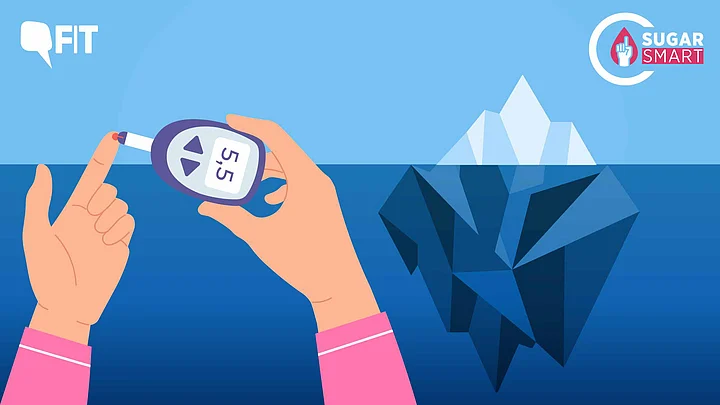Diabetes has emerged as a major public health challenge in India, with a rapidly increasing number of affected individuals. It is now considered a disease that displays the “iceberg” phenomenon, ie the known cases are only the tip of the mammoth iceberg of all the undiagnosed cases.
A recent Indian Council of Medical Research (ICMR) study, too, shows this. There are programs and attempts to address this at the different levels of healthcare services, however, most of these are only at the healthcare services level.
The National Program for Prevention and Control of Cancer, Diabetes, Cardiovascular Diseases, and Stroke (NPCDCS), focuses on early detection, prevention, and management of non-communicable diseases (NCDs), including diabetes. It includes health promotion, awareness campaigns, and strengthening healthcare infrastructure.
National Health Policy 2017, too, emphasises comprehensive efforts to address Non-Communicable Diseases (NCDs), including diabetes. It highlights preventive measures, early diagnosis, and access to affordable treatment.
Lifestyle interventions, such as promoting physical activity and healthy diets, are emphasised for diabetes management. Both of these are being carried out down to the village level, where ASHA workers and doctors are engaged in screening and counselling for NCDs.
The private sector is catering to the increasing prevalence of diabetes.
Disparities Across Economic Groups & States
As usual, here are two Indias – one that relies solely on the public health setup or local healers (if they get care at all), and another that goes to private practitioners and buys branded medicines for diabetes.
In fact, people are spending more out of their own pockets to access better quality of care at the private sector.
In a chronic disease like diabetes, requiring varying doses of medication lifelong, the expenditure keeps adding up. Both prevention and therapy for diabetes rely on food along with medication. In such a case, how far can we go on medicines only?
Most initiatives focus on raising awareness and ensuring compliance in people to prevent and control diabetes.
For prevention, there are programmes such as the Eat Right India Movement. Launched by the Food Safety and Standards Authority of India (FSSAI), it promotes healthy eating habits, aims to reduce the consumption of unhealthy processed foods, and educates the public about the importance of a balanced diet in preventing and managing diabetes.
If we take a step back and observe who is worst hit by this insidious ailment, we can a disparity in the prevalence of diabetes across the states.
The district level data is only available from the NFHS which also denotes a disparity in the prevalence of diabetes. Often a healthcare provider will advice you regarding the need to “eat healthy” but what does this mean in tangible terms?
This raises more questions then.
Who has access to low glycaemic index foods?
Whose cultural practices, that already incorporated these, have now been destroyed?
Who is likely to use alcohol as a coping mechanism that leads to diabetes among a plethora of other diseases?
Who is more likely to develop ketoacidosis, a possibly fatal outcome of uncontrolled diabetes?
Who is likely to be untreated?
Affordability Vs Quality: How Social Factors Impact Public Health
The evidence points out that social determinants of health do in fact impact diabetes. Not just in terms of causation but also the outcomes.
It is seen that people who are food insecure tend to rely on low quality foods that have added sugars among other processing. Once people do get diabetes, they are now reliant on medication which throws up a fresh platter of challenges (for people who have lived with type-1 diabetes all their lives, this burden of meds has been a part of life).
The Jan Aushadhi Pariyojana initiative aims to provide quality generic medicines at affordable prices through Jan Aushadhi Kendras across the country.
It is supposed to reduce the financial burden on individuals managing diabetes and ensures access to essential medications. People who are reliant on generic drugs have complained of poor glycaemic control and switched to branded drugs.
Even for the “middle-class,” spending thousands to ensure quality drugs, every month, is difficult to navigate.
The choice then becomes between quality and affordability. That is, only where there is a choice – at some levels of public healthcare, insulin is not even available, much less of good quality.
Diabetes also threatens to worsen the prevalence and outcomes of other disease, both communicable and non communicable.
Hence, it is important to collaborate across sectors, ensure food security, and affordable and good quality medications that are available through Jan Aushadhi and primary health centres.
The government's policies and initiatives are steps in the right direction, but sustained efforts are needed to address the growing prevalence of the disease.
Comprehensive strategies encompassing awareness, prevention, early detection, and affordable treatment may be essential in combating diabetes, but they are not enough.
We must ensure food security, availability of diverse diets, leveraging of traditional food systems, and job security.
By prioritising diabetes as a public health concern and engaging with people in a way that prioritises them instead of shoving treatments at them, we may progress further in this battle.
We must also remember that diabetes, while deadly in and of itself, does not occur in isolation, so we must remember to address policy towards people and their lives instead of just diseases.
(Dr Shivangi Shankar is currently studying Public Health. She writes about mental health, doctor-patient relationships, caregiver health, awareness regarding diseases, issues concerning healthcare workers, and public health in India. This is an opinion piece and the views expressed above are the author’s own. The Quint neither endorses nor is responsible for the same.)

